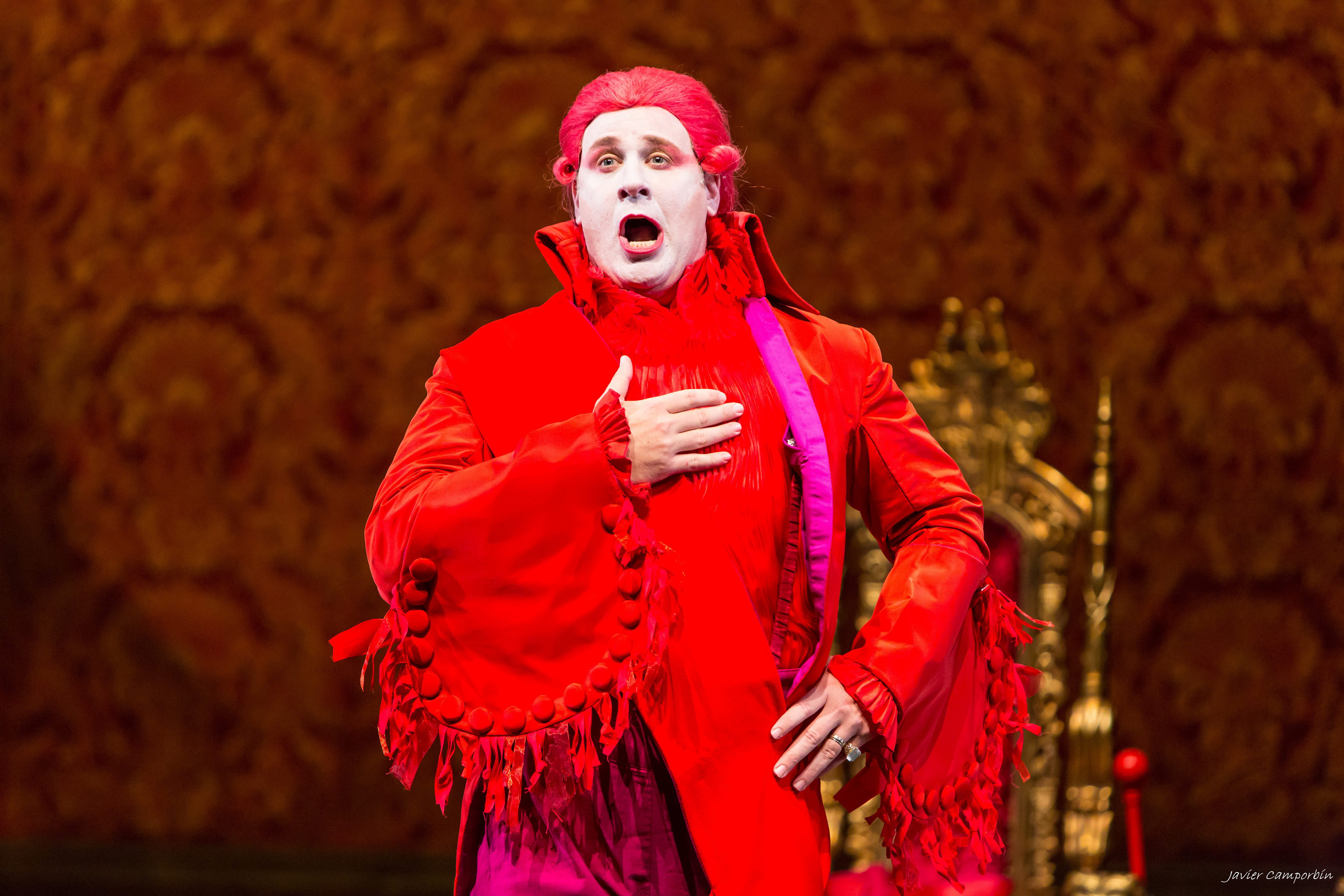
You sit down at a restaurant and your meal arrives at your table. Unfortunately, there is no fork. You ask the server for a fork. Five minutes go by. No fork.
You ask the server again for a fork. They say, “Oh, you need a fork? We’re really busy, but we’ll get it for you.”
Five more minutes go by. Still no fork.
You ask your server a third time. You begin to hear rumors from other people in the restaurant that you’re being difficult. People say, “Can you believe that Lucas Meachem asked for a FORK?! Really? This late in the game? He should have eaten already. It’s HIS job to eat. Why doesn’t he just eat it?”
Your food is now cold. Finally the fork arrives but you haven’t practiced eating with the fork before. You now have to eat your cold meal in an eating competition in front of thousands of people and YOU JUST GOT YOUR FORK! Behold, the diva is born.
Okay, this example might be a bit extreme, but it proves a point. Sure, there are those who will still think such a customer is demanding, but think about it: if you would have received the fork the first time (or the second time), your frustrations would have never boiled over. You wouldn’t have become a diva.
Now, we’ve all heard stories of the occasional opera singer who throws a fit backstage if a certain demand isn’t fulfilled. Ones who haven’t received their “fork” in a timely fashion. In many cases, they’re called “divas”—in a negative sense of the word, not in the celebrated form of an accomplished and beautiful singer. These are the artists who feel they’re entitled. They’re egotistical. And demanding. A “typical” star.
Divas are found in other professions, too, but opera has a particular, shall we say, reputation.
Yet underneath those demands is a real person. Let’s try to understand them a bit more.
Diva With A Cause
Singers have a tough job when tackling a big role on the stage, and they need lots of help. Their to-do list is long: sing your best, be with the conductor, find the light, do the choreography, make your entrances, react to the other singers, obsess over whether your zipper is down, etc. It’s a tough job.
Everyone else in the opera house has a long to-do list, too, and these are the people who opera singers depend on to get the job done (stage managers, wigs and makeup, music staff, etc.). They are the engine of the machine that is Opera.
Now, things don’t always go smoothly. On the occasion that something from someone else’s to-do list isn’t done correctly, and it directly affects the singer—for instance, a prop placement—it can throw the singer off. The singer thinks in the back of their mind, “Where is my prop?” Their focus is no longer on their job, but on someone else’s.
Singers deal with intense emotions onstage, such as stabbing their lover or dying from tuberculosis. So when a mistake happens, a little unexpected emotion might creep out. Their request might come across as negative or demanding because they are frustrated. Though their intention is good, their tone might be too harsh.
You have to understand that if something goes awry, this can really hinder a singer’s process. The singer loses focus for a few moments and when singing an aria, that can be a big deal.
Also, they need proper preparation. For instance, some props require time to master. A tempo needs to be set, or a costume needs to fit.
The Dangers of Being a Diva
Yes, singers can become frustrated and that frustration can come out during a rehearsal. It happens.
So what comes after such a display of emotion? What is the effect of being a “diva”?
Usually, not a good one. Their colleagues might begin to feel disrespected. This can create a hostile work environment. No one wants that!
Conductors, directors, or other influential people in the workplace might not want to work with them again. This can ruin a singer’s reputation, and lead a career to an early grave.
Worst case scenario, the opera company won’t hire them back. While a singer is at a gig, it’s like a huge audition. That company is testing the singer every day to see if he/she is the right fit for a future role, and if they’re productive in the workplace. If a singer becomes overly demanding, you can see how hard it would be for a company to invite that singer back.
Zoom Out
Singers have to know that they are just a cog in the wheel in the big picture that is an opera company. An operatic season consists of many shows, and the company has many more productions down the line. There are lots of singers coming through and few of them have any special privilege.
Opera is a team sport, so singers have to be team players. A “star” doesn’t mesh well in a team if they act like one. Better yet… think of opera as a team where everyone‘s a star! The singers are just as important as the guy who paints the set, the security guard at the front desk, and the repetiteur in the pit. A singer is not “above” anyone else in the company.
Sure, they’re the only ones from the mix who face the audience head on, but everyone is important to the operation and this is vital to understand. (Also, the others work year round, while the singer steps in just once a season.)
How To Get What You Want Without Being A Jerk
I’ll admit I’ve had my “divo” moments. I’m not proud of it.
But I’ve learned from those mistakes, because I know I’m a good guy—I’m just put into a tough situation and let my frustration get the best of me. I try my best to avoid getting to that point, and I haven’t ventured into diva territory for a while now.
When a request needs to be made, start off with nicely asking someone within a certain department, “Would you see if the director is around?” or “Can you see if the conductor can have a talk before the next rehearsal?” Then start the conversation with genuine friendliness, “toi, toi, toi!”, “How are things going?”, “Really excited for opening”, etc. Then, make your request small. “Just this one spot…” “All I need is…”, “Things are going so great. I just need these hairs to stay out of my face.”
So, start with a compliment, then bring up your request. Go in with an open heart and appreciative tone. Everything depends on your tone. And say it with a smile! Because even if you’re right, that doesn’t allow you to be mean about it. Everyone is working hard, so any kind of negativity is just not helpful.
I once heard this great quote from Simon Cowell: treat everyone you work with as if they have a sign on their forehead that says, “Make me feel important”. I always try to remember that advice. Follow these guidelines, and things should go smoothly for you.
DISCLAIMER: no singer under the age of 30 or before their Met debut is allowed to have a “diva moment”. Why? Because you gotta learn to be nice. You haven’t experienced enough negativity to be negative yourself. I’ve experienced a lot of stuff going wrong, and now I’ve got a sixth sense for detecting a problem before it happens.
In fact, even if you’re over 30 and you’ve made your Met debut, there is never an excuse for being ungrateful or disrespectful towards your coworkers. You have to be responsible for your own actions and your behavior no matter what situation you’re thrown into.
What If The Fork Doesn’t Show Up?
If perchance your request never gets filled, here’s my little trick of the trade for keeping your cool when thrown a curveball in dire circumstances.
Let the issue stop a rehearsal.
No, don’t throw a fit and stomp your feet during a piano tech. I mean, subtly use the rehearsal to show people what you need. I admit that this technique is controversial, but it’s all in how you do it:
This one time in rehearsal, I was supposed to go offstage, quickly hand off a sword to a stage manager, then enter back on stage. When I went offstage, the stage manager wasn’t there in the wings to receive the sword. So, I walked back on stage with the sword and sang the next scene waving around this sword—which made no sense to the scene!
Yes, this technique may be a little passive-aggressive. But the key is not to do it with attitude. It’s just a matter of fact that the prop wasn’t removed.
Afterwards, the director came to me and said, “Lucas, you’re not supposed to have that sword during that scene.” I said with a genuinely kind tone, “I know, but there was no one to receive it offstage.” Every time after that the person was there to get my sword, without fail.
The thing is, mistakes happen—that’s what rehearsal is for. But here’s the real mistake: correcting other people’s mistakes. I used to do that. I used to cover up other people’s mistakes because I was a nice a guy. But what I learned over time is not to run out onstage half-dressed if the costume people were late. Just don’t go out at all, or go out in my clothes. Then when you need to explain why you’re not wearing your costume or you didn’t make your entrance, bring up the fact that the costume person wasn’t there in time. Because in cases like this, it’s not your fault. Basically, make sure a director or conductor sees that there’s a problem, instead of trying to cover it up.
Either miss your entrance or go on stage in your street clothes. Do not resort to half-assing.
(Disclaimer: during a live performance or orchestra rehearsal ALWAYS cover up mistakes. Because the show must go on!)
I don’t meant to blame any production or music staff out there—they’ve got a really demanding job. They work around the clock, but if one small thing doesn’t go right on their end, it can be a big deal to someone else. So just imagine how many things they do right in a night!
Today’s Diva
Divas of yore are less of a trend these days—the elitism of opera singers is fading away, and the authenticity of a singer always draws more attention. The truth is that no one likes to work with a diva, and not many people actually enjoy worshipping divas because they can lack gratitude. It’s a dying trend for a reason. It’s become a thing of the past.

One of the most well-known prima donna’s without acting like one is Anna Netrebko. This one time, when I was singing a rehearsal of La bohème with her, we came up to her death scene, “Ah, Come si sta bene qui…” and she stopped singing. She said, “Hold on, I’m so sorry.” She said breathlessly, “This corset is just so tight, it’s a very difficult scene for me to sing. Is it possible for someone to help me? I just need to unlace it a little bit.” Everyone in the room started laughing because she was so sweet. And she sounded amazing while not being able to breathe!
This is a great example of a gracious colleague who respects and appreciates those around her. She is the very definition of a modern diva.
So go forward, singers! Try as best you can to not venture into diva territory, even when it seems so easy. Your reputation and other people’s feelings are on the line.
You will get further when you’re a considerate colleague, and when you understand your part in the larger whole of a production. I always say, you get more bees with honey 🐝🍯
But if you’re in the middle of a performance… you can always eat with your hands!
What do you think? Did you find this article interesting, entertaining, or helpful? Feel free to chime in with a comment below.
